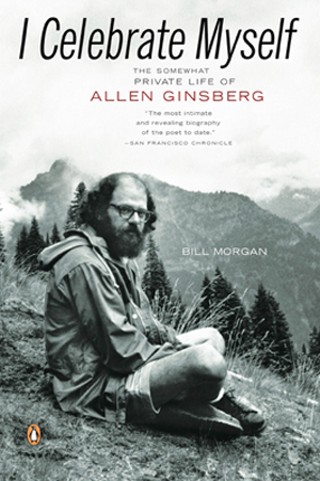Book Review: Readings
This massive biography of Allen Ginsberg, lovingly assembled by Ginsberg's archivist, is a laborious read, at once fascinating and discomfiting
Reviewed by Melanie Haupt, Fri., Dec. 21, 2007

I Celebrate Myself: The Somewhat Private Life of Allen Ginsberg
by Bill MorganPenguin Books, 702 pp., $18 (paper)
Deconstructionist theory tells us that the work of mourning often includes the impossibility of speaking of and for the dead without interjecting oneself into the discourse. How does one work as a medium for the dead? How does one decide what to include and what to leave out? Decisions must be made in the work of citing and describing in order to create an ethical representation of the subject. Such is the major affliction of this massive biography of Allen Ginsberg, lovingly – nay, slavishly – assembled by Ginsberg's archivist, Bill Morgan, who had access to the influential poet's most intimate diaries. It appears that no decisions have been made and that the ethical decision was to include everything, which one might argue is a rather narcissistic move on Morgan's part. The result is a laborious read both fascinating and discomfiting: Does anyone really need to know that a school-aged Ginsberg was sexually aroused when watching his chums being bullied and pantsed in the school yard? Some things should stay in the archives. This is not to say that the work is uninteresting: Anyone with any interest in the inception and trajectory of the beats will relish the depth of representation of the relationships among the celebrated writers, what they were reading, whom they were fucking, and what they were smoking when they were doing it. Morgan leaves no stone unturned, revealing the evolution of Ginsberg's Buddhist practice and his long, troubled relationship with partner Peter Orlovsky. Most admirably, Morgan includes a marginal notation of what poems were written during each particular era of Ginsberg's life (each chapter covers a year in Ginsberg's life, hence the heftiness of the book), providing context for many of his works. Morgan's account of Ginsberg's final days is exhaustive and loving; he wants nothing left to the dustbin of history and so accounts for every phone call made, every chant chanted, every famous visitor to Ginsberg's New York deathbed. It is both admirable and exhausting, a triumph of the archive and of the archivist's work, which prompts the question: Who is the true "I" being celebrated in the book's title?











